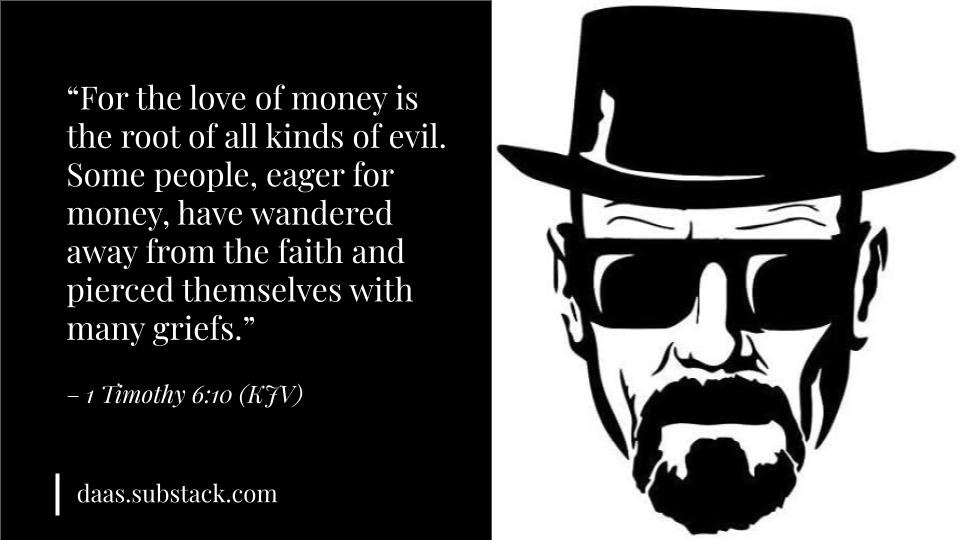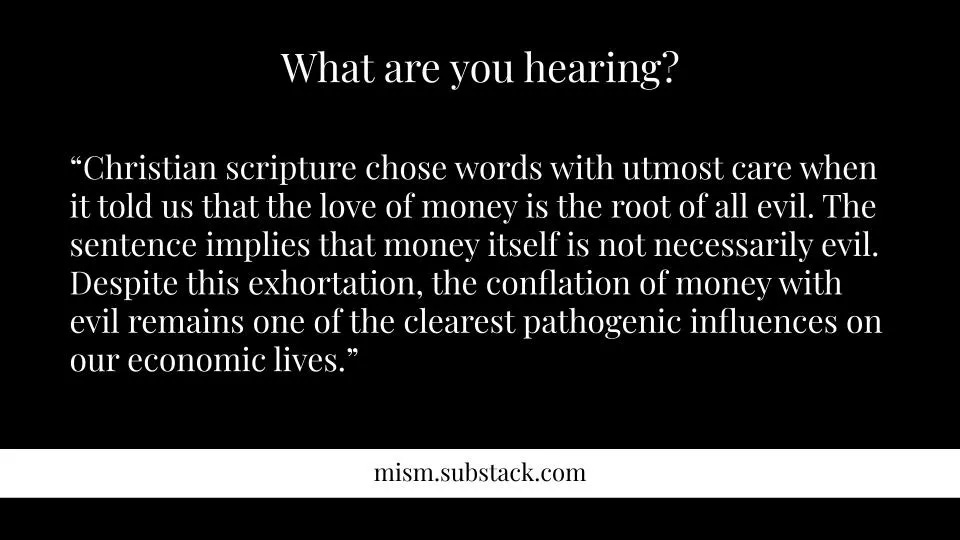I'm excited to report that I recently received God’s new responses to Part 1 and Part 2 of this paywalled prayer. The responses are published behind the paywalls. Below I bring you Part 3 of this prayer.
Dear God: A Paywalled Prayer - Part 3
Thank You
Thank you for your latest responses, dear God. I’m so glad we started this conversation.
If we had started this conversation before the turn of the century, I would've felt impatient, hoping for something more tangible in your responses. With the looming deadline for your final response tomorrow, my younger self would’ve assumed that Sodom and Gomorrah’s fate was sealed. But so much has changed over the past quarter century. I now feel at peace with the deadline, and deadlines in general.
Ever since you led me to Nietzsche’s idea of amor fati, I have increasingly felt at peace. Ever since you brought me Carl Jung’s instruction to notice what supports me when nothing supports me, I have felt at peace, and I have felt your support. Ever since your guidance led me to the word perichoresis, I've been increasingly enjoying the dance of life. I now know that those are your foot prints in the beach sand carrying me through my most challenging times. So thank you, dear God. With your support, I am now so close to the promised land, I can taste the milk and honey.
Thank you also for revealing to me “the unheard story of money”, which I intend to share through MISM starting next month. Through this story, I became aware of one of the clearest obstacles on my journey to the promised land. By this, I mean not only trolls and attention thieves in general, but a particular genre of trolling that distinguishes itself by trying to shame Substack publishers for using the paywall. I recently blocked one of these parasitic critics, and I’m still amazed by how cleverly they disguise themselves as understanding supporters. I’m also amazed by how well these creatures thrive in kleptocratic economies. These shame-fueled trolls are programmed to spread the perversions of their monetary consciousness. Shame is their ideology, and for this reason, they do not belong on Substack, certainly not on any of my Substacks. Thank you, dear God, for helping me unmask and expel these agents of Pharaoh from my tabernacle.
I can’t move past these expressions of gratitude without also thanking you for your support in the creation of the M2D podcast episode on radical optimism. This interview is scheduled for publication tomorrow, and I can’t wait to see how you incorporate it into the service of the DaaS mission that I discussed in the first two parts of this prayer.
Now, let’s talk about crossing the finish line.
Metrics and Deadlines: A Reminder
Recall that, in Part 1 and Part 2, I mentioned a specific goal, a KPI, if you will. With your continued guidance, dear God, I believe that the achievement of this goal will mark my entry to the promised land. The goal is to form a quorum of ten people who meet two criteria:
They have a problem to which Dialogue as a Service (DaaS) can provide a uniquely fruitful response.
They can afford a yearly subscription.
Again, September 25th — tomorrow! — is the deadline and the moment of truth, and I look forward to your final response. Dear God, I pray that you “answer me in the truth of your salvation”. I pray that this truth leads you to lift the paywall below for ten qualified quorum members.
I do want to acknowledge a message that you’ve reiterated several times since I started writing this prayer. I understand that you often answer prayers in ways that the supplicants can’t anticipate. I’ve been assuming that we don’t even need to spell out such fine print, but since you brought this up, I urge you not to interpret anything I’ve written in this prayer as a foreclosure of unanticipated possibilities. In fact, I am wholeheartedly open to the possibility that you may satisfy the need that brought me to you in a way doesn’t technically satisfy my KPI.
For example, after hosting the first guest on the M2D podcast, I would be overjoyed if you answer this prayer by bringing me nine more podcast guests as good as my first. However, dear God, let’s avoid miscommunication. Whatever your answer to this prayer, please make it tangible and comprehensible. For example, if you decide to answer me with podcast guests instead of paying subscribers, please guide the guests to fill out my podcast guest form. I can’t read the desires you stir in their hearts; I can read responses to the form.
Finally, God, instead of choosing a metric to meet, why not meet all the metrics? Why not bring me ten paying subscribers AND ten podcast guests? After all, you are the omnipotent One True God (OTG). Let’s go all the way!
The Good News
In addition to my gratitude to you, dear God, I’m grateful to sources like
for publicizing the good news of your return. Please let me know if there are any other credible sources I should follow more closely.Dear Subscriber
After the publication of this post, God may guide you to lift the paywall below and become a paying member of the first DaaS quorum. Or, God may guide you to join me as a guest on one of my podcasts. Or, God may suggest another way for you to support the DaaS mission. If you receive guidance from OTG, then “Do justly. Love mercy. Walk humbly with thy God.”1 If I can be helpful, email me at daasnow@proton.me. Either way, “do as you will.”2 In the meantime, enjoy the introduction below to the story I intend to share through MISM, starting next month.
Money: The Unheard Story
I wouldn’t try to write the untold story of money because I’m not ready for the challenge. The untold story of money, just as the untold story of anything, hasn’t been told because no author we know has yet risen to the challenge. By contrast, the unheard story of money, just as the unheard story of anything, is easy to write based on existing texts.
Unheard stories are part of what the psychoanalyst Otto Rank described as the massive overproduction of truth that can’t possibly be consumed. These stories are out there — accessible but tragically unconsumable. I’ll discuss the bibliography of my sources in future posts, but here, I’ll focus on why the unheard story of money is easy to write but impossible to hear.
When the sound of this story passes through the filter of ideology, the story becomes inaudible, both to the people who have money and to the people who don't. This inaudible story organizes our economic reality, but our attention favors the stories we hear — the stories easily translatable into text and marketable through our media.
Even though they distort the underlying reality, the audible stories do for us what the light from the lamp post does to Nasrudin. In the parable, Nasrudin looks for his house keys under the lamp post even though he had lost the keys in an unlit area. The mind has a natural preference for comprehensibility, even when this preference proves sub-optimal or self-defeating.
There are ways of working around this quirk of human attention. Over the centuries, writers adding to the overproduction of unheard stories have used myth, metaphor and poetry to at least hint at the shape of these stories. With these departures from plainly propositional statements, writers working within the constraints of the textual medium found ways to suggest what they couldn’t state. The best among them have sparked life-changing realizations generally inexpressible through text.
One thing these workarounds have in common is that they require writers to choose words carefully — far more carefully than they normally do. For example, I believe that Christian scripture chose words with utmost care when it told us that:
…The love of money is the root of all kinds of evil. Some people, eager for money, have wandered away from the faith and pierced themselves with many griefs.
This verse in 1 Timothy 6:10 (KJV) suggests that money itself is not necessarily evil, but the love of money is not only evil but also the root of all kinds of evil. Through the prism of this verse, we can think of money problems as disorders of love. We can also think of hatred, including the hatred of money, as one of the most widespread disorders of love. I suggest that, just as the love of money is the root of all kinds of evil, so too is the hatred of money. Despite the exquisitely worded exhortations of Christian scripture and countless other sources, the conflation of money with evil remains one of the clearest pathogenic influences on our economic lives. I’ve observed this pathogenesis on Substack and across my media.
I believe that, whether people suffer from the love or hatred of money, these disorders of love make people economically toxic and incapable of participating in conscious dialogue about money.
False Questions
Here are my own carefully chosen words about the unheard story of money and one of the reasons for its inaudibility.
There are stories about money that we cannot hear because of the dominance of false questions in our conversations about money, including conversations with ourselves. Perhaps the most familiar false question is “How can I make more money?” Or “Why am I not making more money?” Or “Why am I now making less money?” In my view, these are all false questions. By contrast, true questions include “How have I made money? and “How have I lost money? For me, one of the truest and most fruitful questions about money isn’t even explicitly about money; it’s inspired by Carl Jung’s suggestion to notice what supports us when nothing supports us.
We may lose money due to the force of chance or the loss of vigilance. Not much we can do about chance, but we can always improve our vigilance. For participants in kleptocratic economies, there are many things to be vigilant about, starting with attention and money.
Changing Our Relationship with Money
Even more important than cultivated vigilance, pattern recognition is the golden road to altered states of monetary consciousness. For example, in the upcoming first episode of the M2D podcast, my guest and I discuss a well-researched trade-off that helps explain a self-defeating pattern in our relationship with money: In the age of radically accelerating change, many of the known ways of making money are becoming obsolete, while many of the new ways are experimental and unproven. In response to this clearly observable pattern, most people are either doubling down on what no longer works, or they are “breaking bad” even though this path “pierces them with many griefs”.
What Are You Hearing?
What have you heard about the root of evil, the love of money or pattern recognition? Feel free to respond by email. If you’d like to join me as a guest on one of my podcasts, start by filling out this form. As a podcast guest, you can receive a free personalized summary of the paywalled responses from OTG.





